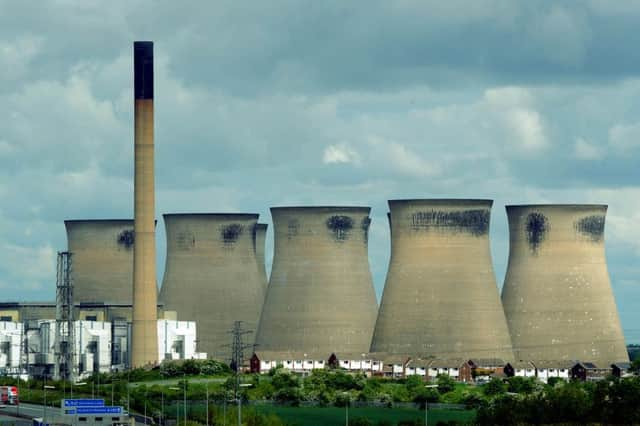Tony Lodge: Blame the last government for shock Ferrybridge decision


Ferrybridge, near Castleford, started generating electricity in 1966. It was one of the biggest coal-fired power stations in the country generating over 2000 MW (megawatts) of power to the National Grid. In 2014 half of the plant stopped operating as it had not been updated to meet strict new EU emissions rules, but a crucial 1000MW, enough power to supply electricity to around one million homes, was expensively updated to run on.
So why has the power station closed early, citing soaring running costs, when coal prices are at an eight year low and when the plant was modernised to stay open through until 2023?
Advertisement
Hide AdAdvertisement
Hide AdThe Carbon Price Floor is hardly the buzz term of the moment, but for those 172 Ferrybridge workers who face the sack and those concerned about the direction of British energy policy, then it should be. To use a shorter and more descriptive title, this ‘carbon tax’ is slowly forcing the closure of the backbone of our electricity generating base.
So what is the Carbon Price Floor tax, why is it so damaging and why did a Conservative-led Treasury introduce it? In short it is an easy tax grab by the Chancellor but the potential side effects were clearly never examined or accepted. They are disastrous as we are now seeing. Introduced in 2013, it taxes emissions from coal-burning power stations at a rate nearly five times higher than the equivalent taxes which exist in the rest of Europe; in short it is a tax grab on the very power stations which are providing the lion’s share of our electricity supply.
The results are clear; early power station closures, higher electricity prices, skilled job losses and higher costs in manufacturing and industry.
Up until April 2013 Britain was a key player in the EU wide Emissions Trading Scheme (EU ETS) and shared the same carbon prices as the rest of the EU. Though EU carbon prices were considered too low to effectively penalise big polluters, all of Europe’s emitters were on a level playing field and paid the same prices for their carbon dioxide emissions.
Advertisement
Hide AdAdvertisement
Hide AdHowever this has not happened. Today, the price for carbon faced by power stations across the EU is just £5.30p; the price paid by British coal power plants is £23.38p per tonne of CO2 emitted.
Clearly this makes running a power plant like Ferrybridge uneconomic, irrespective of low coal prices. A question mark must now hang over the future of neighbouring Eggborough, Drax and Scottish and Southern’s other large coal plant at Fiddlers Ferry, near Warrington.
The previous Government’s policies have forced Ferrybridge to close with its ill-conceived carbon taxes. The new Conservative majority Government can only deliver its manifesto commitment to “guarantee clean, affordable and secure energy supplies” by the repeal and abandonment of the Carbon Price Floor tax in the interests of delivering lower prices, energy security and a credible and coherent energy policy.
If the tax is not urgently addressed then the consequences are indeed stark, particularly for this region. There could now be further early closures of coal plants across Britain; last year these elderly but reliable assets generated around 35 per cent of electricity supply and this can rise to 40 per cent at times of higher winter demand. Another consequence is the reduced likelihood of new coal plants with carbon capture and storage or “clean coal” as they will need the skills and infrastructure transfer from old plants to new ones.
Advertisement
Hide AdAdvertisement
Hide AdIt will mean the collapse of the domestic coal industry as its customer power stations refuse to forward purchase coal due to uncertainty. This will inhibit any proposed new mining investments. British security of energy supply will be hugely diminished; importantly there are no shiny new equivalent-sized power stations being built to replace Ferrybridge, the Longannet plant or any other possible closures which this announcement may prompt. The last government hoped new gas fired power stations would be built but this hasn’t happened and the much heralded new nuclear power station at Hinkley in Somerset is at best a decade away.
Conservatives need to end the Carbon Price Floor tax as a priority. The disastrous early closure of Ferrybridge and the domino effect this could start is the first major test of the new government. Will it deliver on its manifesto commitments or continue on the slippery slope?
Tony Lodge is a Research Fellow at the Centre for Policy Studies. His new pamphlet, ‘The Great Green Hangover – How the new Government can reduce bills and avoid an energy crisis’ will be published in the summer.